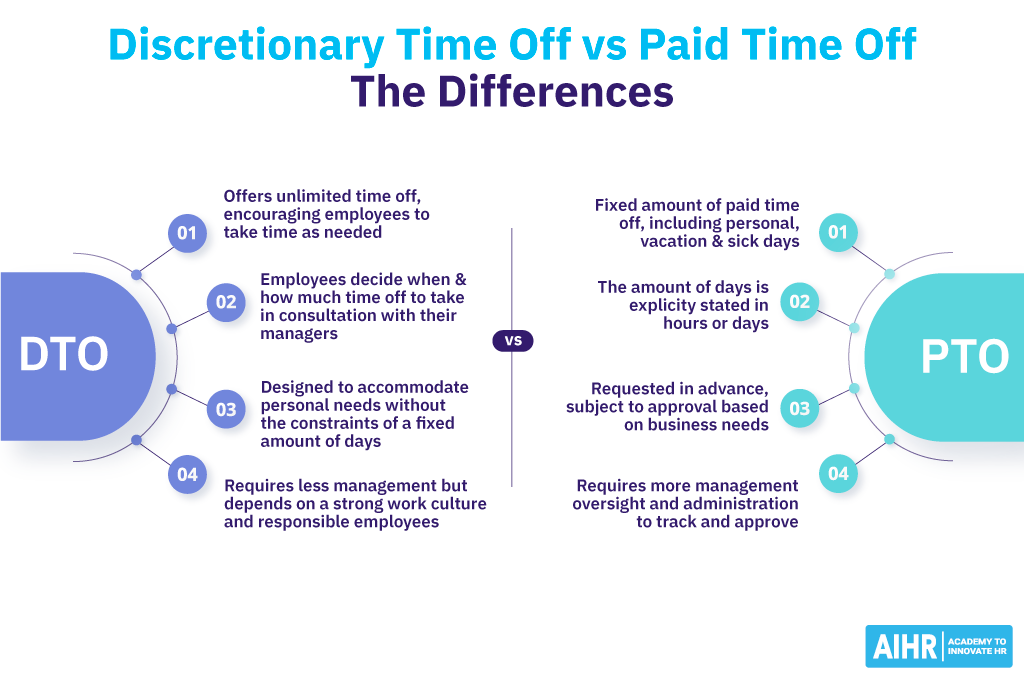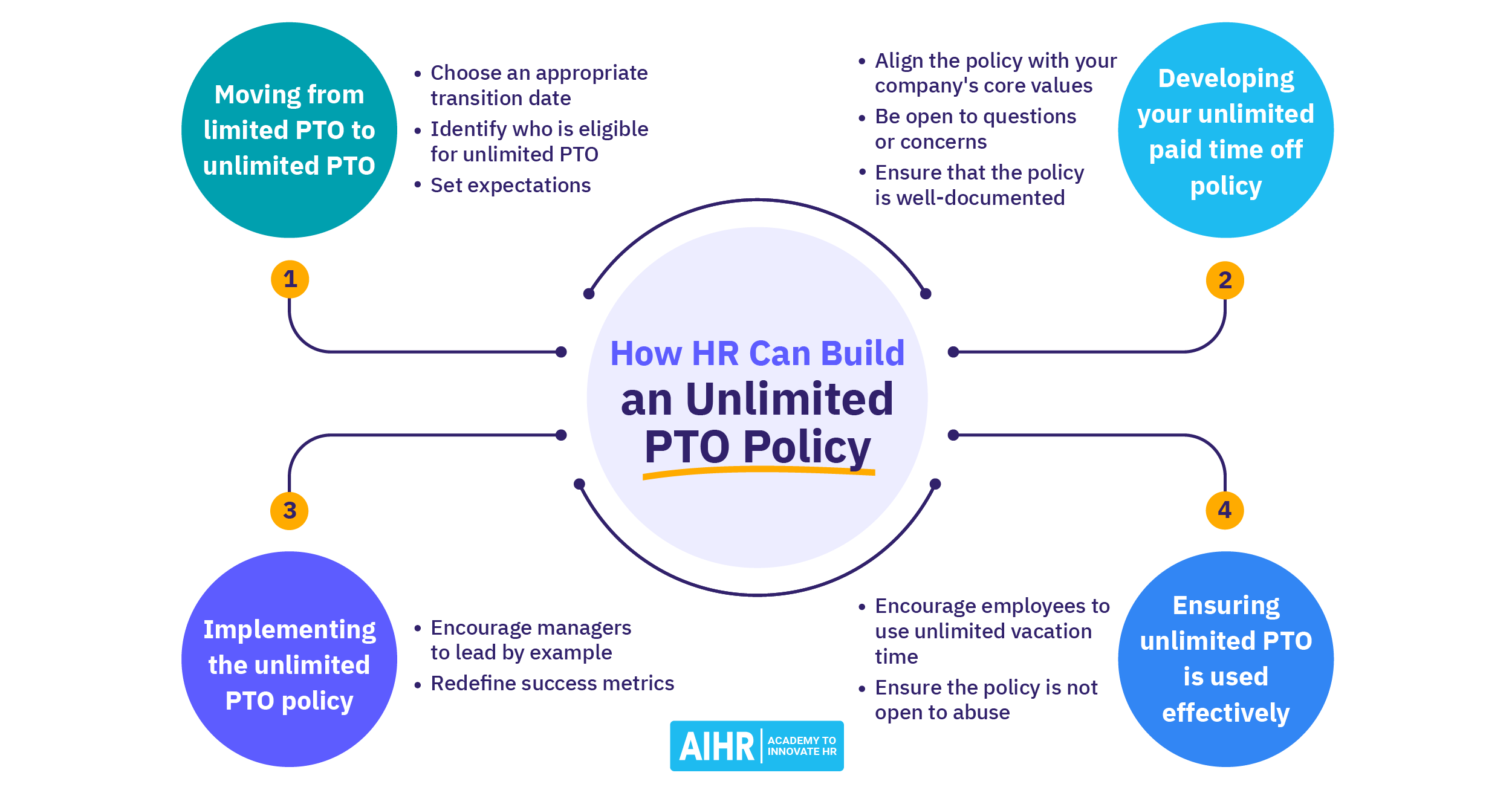Discretionary Time Off
What is discretionary time off?
Discretionary time off (DTO) is a leave policy that allows employees unlimited paid time off each year. This system provides staff with the flexibility to take leave as needed – whether for vacation, appointments, or other personal matters. While DTO does not impose strict limits, it often includes recommended guidelines, such as not taking more than three consecutive weeks off.
Depending on the company, an employee may need to get prior approval to take discretionary paid time off. Approval may depend on the number of days requested and the needs of the company. Unlike traditional vacation day policies, employers don’t pay back employees for any unused DTO when they leave the company.
Discretionary time off vs paid time off
There are important distinctions between discretionary time off and paid time off. Here are some key differences:
| Aspect | Discretionary time off | Paid time off |
| Definition | No limit on the number of paid time off per year | Fixed amount of paid time off, including vacation, sick days, etc. |
| Planning and approval | Generally, employees take paid time off when needed. Minimal approval process | Depending on type of leave, formal request and approval is needed |
| Tracking | Less emphasis on tracking the exact number of days taken | Detailed tracking of accrued and used days |
| Management style | Depends on a relationship of trust among managers and employees | Need to monitor employees’ use and compliance |
| Suitability | Works well in a high-trust company and flexible working environments | Best suited for companies with structured ways of working and processes |

Benefits of discretionary time off
Some of the key benefits of offering discretionary time off are:
- Reduces administration: Discretionary time off policies can reduce the administrative duties of tracking vacation accruals. It also simplifies the process and management of time-off requests, leaving it up to the employee and manager.
- Increases job satisfaction: Allowing employees more control over their time off creates a sense of empowerment and trust. This autonomy not only boosts morale but also cultivates a more positive and engaged workforce.
- Promotes work-life balance: At the heart of DTO is the discretion to take time off when you need it. For many employees, it allows them to have a better balance between work and personal/family needs.
- Improves talent attraction and retention: Companies that offer discretionary time off are often more attractive to potential employees. This benefit can foster greater wellbeing, which is a competitive advantage for attracting and retaining tfop talent.
Drawbacks of discretionary time off
Despite the benefits, DTO does have some drawbacks, including:
- Employee misuse: Some employees may take advantage of a DTO policy by taking an unreasonable amount of time off. This misuse can create mistrust and negatively impact team dynamics and overall productivity.
- Inequality in usage: Certain job roles have greater flexibility than others, leading to unequal use of discretionary time off across an organization. Employers must ensure that all employees have equal access to DTO.
- Impact on team dynamics: Discretionary time off can lead to unpredictability in scheduling. If many employees decide to take time off simultaneously, it can disrupt workflow and project timelines.
- Management difficulties: Managing discretionary time off requires a robust system to track and approve requests. Without proper management, it can lead to staffing issues and operational inefficiencies.
Discretionary time off policy: What to include
Before implementing a DTO policy, it is crucial to consider the impact it can have on employees and the entire organization. Here are some ways that HR can design a successful discretionary time off policy:
- Establish clear guidelines: Provide a comprehensive overview of the organization’s DTO policy. Guidelines should clearly define what discretionary time off means and how it differs from other types of leave (e.g., family leave, medical leave, etc.). Outline the procedure for planning, requesting, and approving discretionary time off.
- Specify eligibility: Identify which employees are eligible for discretionary paid time off. In the U.S., DTO is primarily offered to salaried exempt employees (and not to hourly non-exempt employees). Some companies like Microsoft only offer DTO for U.S. based employees because of legal and regulatory differences in other countries.
- Provide guidance and training: Clearly outline employee responsibilities for using DTO, such as advanced notice, workload cover, the maximum amount of consecutive days, etc. HR should also ensure managers receive training on managing DTO requests, providing guidance on maintaining productivity during employee absences.
- Pilot the policy: Conduct a pilot program with a smaller group of employees and managers to test the policy. HR teams should monitor, track and gather feedback on the usage of DTO, and adapt the policy where needed.
- Ensure legal compliance: Before rolling out your DTO policy, ensure compliance with the employment laws and regulations of your country. Discretionary time off does not replace mandatory leave requirements such as family, medical, and parental leave.
- Carefully monitor: Continuously assess and monitor the effectiveness of the DTO policy. Utilize surveys and focus groups to collect feedback from employees and managers to assess usage, impact, and satisfaction with the policy. This proactive approach can help you modify or even terminate DTO.
HR tip
A successful DTO policy depends on trust and open communication between employees and managers. HR professionals can support open discussions of discretionary time off by encouraging it during regular check-ins and ongoing performance management.
FAQ
The approach to compensating discretionary time off (DTO) can differ from one company to another. In most cases, employees continue to receive their usual salary during DTO periods.
The terms discretionary time off and unlimited PTO are often used interchangeably, but there are some key differences in their overall philosophy. With DTO, the emphasis is on allowing employees to choose when to take time off, without a specific limit. For unlimited PTO, the policy focuses on “outcome-driven results.” An employee can take time off without a predetermined limit as long as they meet their workload demands and performance expectations.







